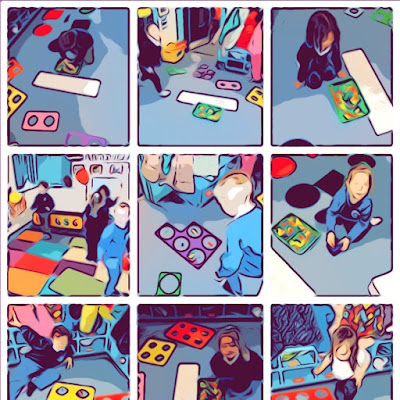If you had asked me a few years ago, I would have said that young children can learn their key academic skills in nursery through play by carefully chosen material to allow them to just develop skills like knowing colours, shapes, numbers, letters etc. But now I have revised this belief and it has been a journey that has coincided with many different events all coming together to help me realise that we need to actually teach key skills in a playful way with a particular emphasis on maths.
I have made some great on line friendships with other early years educators and some of them have helped me begin to realise that I do have a role as a teacher rather a mere facilitator in in classroom. I have been so fortunate to meet up with some of these friends and see them interact with young children, either in their own setting or with children in another setting. Unnur Henrys, a friend and colleague who teaches in Iceland has taught me so much about maths acquisition. I have watched her playing with dice in the forest with children as young as 2 who were excited to match items to the right number. Unnur has inspired me to have large dice in my playground to allow children to explore maths in their play. Lesley Romanoff, another friend and colleague in the U.S had shown me how smaller dice could be incorporated into everyday play inside and used as another 'loose part'. Before seeing them in her setting I would not have thought to have dice in my nursery classroom. Now I can't imagine not having them.
In 2018 our school began 2 new Erasmus Plus projects, a KA2 maths based project with preschools in Turkey, Finland, Croatia, Greece and Denmark and a KA2 staff based CPD project. During the latter I got the opportunity to do a course in Iceland with Kristín and Sarah from Smart Teachers Play More that opened my eyes to the possibilities of how to teach core academic skills in playful manner. In our KA2 I have been fortunate to learn many new maths & science games and activities from my partners, you can read about this project here: http://nosuchthingasbadweather.blogspot.com/2019/10/erasmus-plus-ka2-finland.html
 |
| Sharing some maths activities with children in our partner school in Croatia. |
 |
| PTLM sessions on colour and number. |
 |
| The Hungarian ten frame in action during play sessions indoors and outdoors. |
In particular this sentence stood out for me "As a result, Davenall agrees with Sue Gifford’s earlier finding that children are 'unlikely to learn about number through independent play ... a laissez-faire approach to children learning maths in the 'secret garden of play' does not work. Opportunities may be there, but children will not necessarily take advantage of them'"
So I will continue to flood my classroom and playground with maths resources as before but I will consciously teach the children how to use them first before putting them out, some will continue to explore them in a mathematical way whilst others will simply play with them, that is ok but I'll know that I have at least given them all the skills to be a mathematician and to love, enjoy and be excited by maths.









